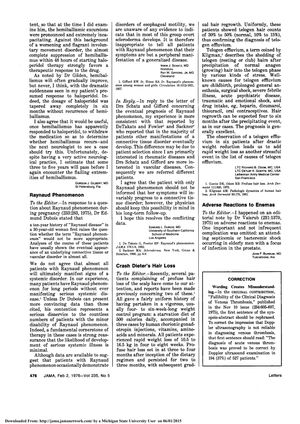Raynaud Phenomenon - Reply
February 1976
in “
JAMA
”

TLDR Doctors disagree on whether Raynaud phenomenon often leads to serious diseases, but agree that patients should be monitored for possible progression while being reassured. Rapid weight loss may cause hair loss.
In a letter to the editor, Dr. Edmund Dubois suggested that patients with a long history of Raynaud phenomenon often develop an underlying connective tissue or vascular disorder. However, Drs. Irwin J. Schatz and Ray W. Gifford Jr. disagreed, stating that many patients with Raynaud phenomenon do not develop serious systemic diseases and that it is a disservice to suggest otherwise without more convincing data. They emphasized that reassuring patients about the minimal likelihood of developing serious systemic illness is a key part of therapy. Dr. Dubois responded by acknowledging that while patients with only Raynaud phenomenon should not be told that their symptoms will definitely progress to a connective tissue disorder, physicians should be aware of this possibility during long-term follow-up. Additionally, the document mentions a study of telogen effluvium, a condition of hair loss, in patients who underwent rapid weight loss, suggesting that drastic weight reduction should be added to the list of stress events that can cause this condition.



